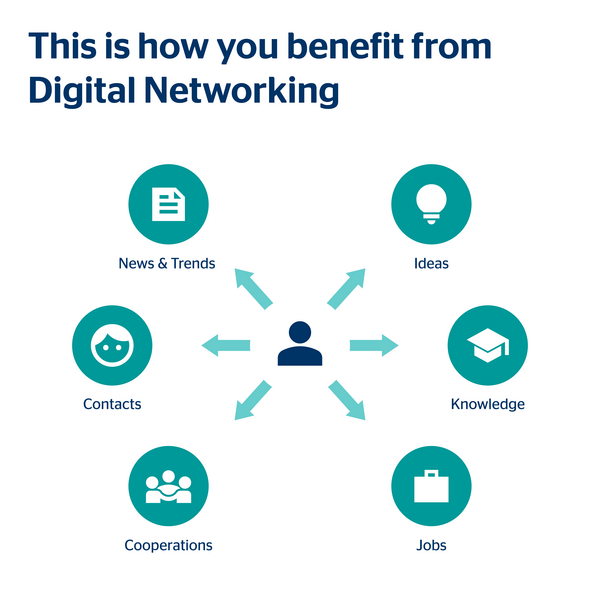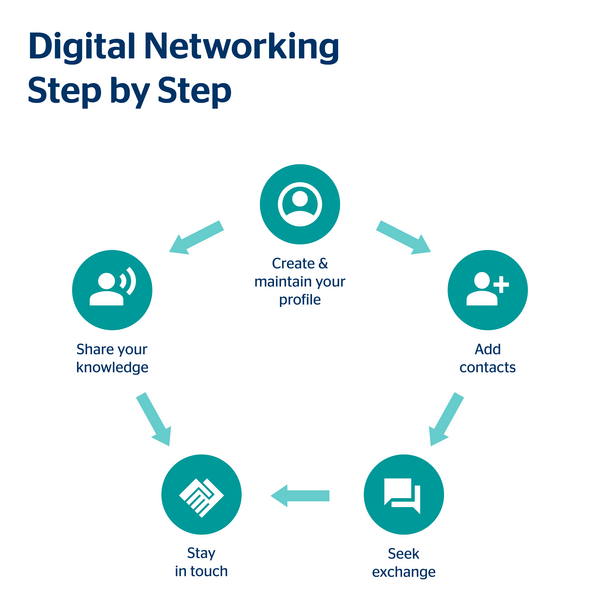Digital Networking: Guide and tips for successful networking
|

reading time: ca. 7 minutes
- In contrast to classic business networking, digital networking allows you to meet new people and make great contacts anytime and anywhere. A strong network is invaluable, especially when looking for a job.
- The first step is to create a profile on online platforms and become active. When you connect with the right people, get involved, and cultivate relationships regularly, you benefit from many long-term opportunities.
- Proper networking means showing your own skills, personality, and initiative. Authentic communication is key.
- Of course, this doesn't work immediately. Instead of expecting quick results, you need to invest time and be patient. To avoid the typical beginner's mistakes, keep your profile well-maintained. Also, actively engage and use targeted communication, rather than making mass requests.
Networking is no longer limited to face-to-face meetings, events, and trade fairs. Nowadays, digital networking is more than just a trend, it is almost a must in everyday working life: good connections remain a door opener that provide you with many career opportunities. Fortunately, networking can be learnt! Our expert Jagoda Banert gives five important tips and reveals the mistakes you should avoid.
"Nico, I need you!" With this message, Nico becomes aware of OVB for the first time. He works freelance for various production companies and service providers, while also maintaining his appearance in online networks. Through LinkedIn, he is finally contacted by Jagoda, who is looking for promising talents for OVB.
Less than two months later, Nico signs his contract as Communications Manager at OVB. "I thought it was great how personal and quick the process was," he says about his rapid start. "After two phone calls and a Zoom call, the decision was clear to me. The team gave me a good feeling, and Jagoda always sought personal exchange."
This is exactly what Jagoda considers important: "Networking allows job seekers to digitally meet the relevant people in companies and to consider early on: Are these the people I want to work with? Do I want to support the company?"
It is no longer unusual for companies to actively approach potential applicants via business platforms. With a well-maintained online profile, you will not only find new jobs, but also valuable contacts.
That's why digital networking is important
Just a few years ago, it was necessary to attend trade fairs and events to make contacts. This is much easier nowadays.
Social media, forums, and business networks such as LinkedIn allow you to connect with colleagues, business contacts, and industry peers with just a few clicks.
According to LinkedIn statistics, 65 million people use the platform every week to search for jobs. 28 million people use the "OpentoWork" function, and 6 people find a new job every minute.
Many people still avoid proactive networking – either because they don't know how it works or they don't see the benefits.
What exactly is digital networking?
Digital networking is a way of getting in touch with other people, exchanging information and maintaining relationships through online platforms and social media.
This allows you to make contacts and network with like-minded people regardless of time and place. You don't have to be present in person.

Successful networking gives you access to valuable resources, for example:
- Ideas
- Knowledge
- Jobs
- Cooperations
- Contacts
- News and trends from the industry

Networking is not your cup of tea?
The good thing about digital networking is: Unlike face-to-face meetings, you don't have to be a pro at small talk and socialising. It's much easier to present your skills and experience online.
With a good strategy and a little time invested, everyone can succeed!
Successful networking is not that difficult once you've got started. These are the five most important steps:
- Create and maintain your profile
- Add contacts
- Seek exchange
- Stay in touch
- Share your knowledge
Note: Networking is not a process that is completed after five steps. Think of it more like a cycle: After step 5, you go back to step 1, refine your profile, find new contacts, and so on.

1. Create and maintain your profile
The first thing you need is an account on the right platforms. This is where you need to overcome your initial reservations and become visible online.
To fill out your profile, you can start with the following data:
- Basic information and contact details
- Professional photo for your profile
- Work experience
- Education and training
In the future, make sure to update your profile regularly. Add new skills and qualifications. Include work samples. Write about yourself and your goals. This will refine your profile.
2. Add contacts
Search for people you have met during your career or who pursue similar goals and interests.
Even as a career starter, you can make initial contacts. For example, connect with people you know from school or university. Start small and let your professional network grow over time.
Send personal, individual contact requests and explain why you would like to connect with someone. For example, describe your goals and skills or offer (mutual) support.
3. Seek exchange
Don't remain passive – participate in communities actively.
Search for relevant groups and forums and take part in discussions. Here you can get involved, ask questions, and make new contacts at the same time.
Platforms often allow you to find and take part in suitable online events and webinars: another chance to meet interesting people and expand your own network.
4. Stay in touch
Adding contacts is one thing. Maintaining them is another.
Examples of how to do this are:
- Personal follow-up messages
- Mutual support
- Recommending contacts, jobs, or resources
- Sharing professional ideas and advice
- Offering information
- Pointing out interesting posts or events
- Congratulating on special occasions, promotions, or birthdays
Invest time regularly to write and reply to messages. Make sure to post, share, and leave comments.
Think about how you can help your contacts. This will make you a valuable contact for others.
5. Share your knowledge
Networking is all about give and take. The more support you offer others, the more you will get back in the long term.
The first question is not "How can others help me?", but "What do I have to give?"
Share your expertise and skills – not only with existing contacts, but also in groups, communities, or publicly in your posts.
This will make other people from the industry aware of you. They might ask you for advice or offer support in return.

Jagoda Banert has been a Recruiting Manager at OVB since 2023. She is active on business platforms and recruits new employees online.
With her extensive networking expertise, she answered our key questions on the topic and gave us the five best tips for new networkers.
Here are the most important tips and tricks for building a professional network and attracting recruiters’ attention:
- Present your competences correctly. "Use the headline and summary to present your professional goals, experience, and skills. Relevant keywords in your profile will help others find you in search results."
- Show who you are as a person. When recruiters are looking for new talent, they don't just focus on technical skills, but also on personality. "Every activity can help me determine the culture match – whether the person fits into our company or not."
- Prove your skills. "Collect recommendations from team members or managers to strengthen your credibility. Or add presentations, articles, or videos to your profile that highlight your experience."
- Get actively involved. In addition to a complete and up-to-date profile, it is important to show initiative. "For example, follow company profiles or like and comment on posts. Engagement in the industry draws the attention of recruiters and talent scouts to you."
- Communicate authentically and individually. "When approaching someone, send a customised message that sparks interest and offers added value for both sides. It's great to point out the mutual match. This demonstrates that you're genuinely interested and have engaged with the person."
And what is the future of digital networking?
One thing is clear: the digitalisation of the professional world continues to grow. Digital platforms have become permanent tools for collaboration, job hunting, and networking.
Our networking expert Jagoda is also observing the increased use of artificial intelligence and personalised algorithms. Online events and virtual job fairs are becoming increasingly important as well.
But even in times of AI and automation, nothing can replace personal networking: "I believe that the strongest trend for the future is that we will increasingly appreciate exciting, empathetic, and creative dialogue, within the processes simplified by AI!" After all, there’s one thing artificial intelligence can’t replace: your own personality.



